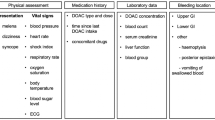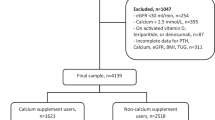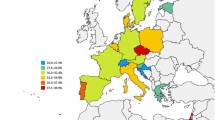Abstract
Background Anticoagulation therapy with anti-vitamin K (AVK; vitamin K antagonist) for the prevention of thromboembolism in patients with atrial fibrillation (AF) is based on information derived from numerous well constructed, randomized controlled trials. Despite this conclusive evidence of efficacy, several studies have shown that ‘real world’ use of AVK in patients with AF is suboptimal. Our hypothesis was that geriatric characteristics (functional impairment, cognitive disorders, malnutrition, risk for falls, depression) could be an explanation for the underprescription of AVK in older patients with AF.
Objective To analyse the barriers to the prescription of AVK therapy, with special attention on geriatric characteristics.
Methods This was a retrospective study of 768 consecutive geriatric patients admitted to an acute geriatric unit of an academic hospital between April 2006 and November 2008. Data from comprehensive geriatric assessments were collected from computerized medical charts.
Results Analysis of data from the 768 medical charts showed that 111 patients (14%) presented with AF. Among the 111 patients (72% women), 45% were living in an institution before admission. These patients presented a high prevalence of geriatric syndromes: cognitive disorders 59%, malnutrition risk 59%, incontinence 35%, depression 37%, and falls 61%. Ninety percent of the patients had an Identification of Seniors At Risk (ISAR) questionnaire score ≥2, which indicates an increased risk of frailty and functional decline during hospitalization. The prevalence of conditions measured by the CHADS2 (congestive heart failure, hypertension, age >75 years, diabetes mellitus and previous stroke or transient ischaemic attack [TIA]) clinical prediction scale was as follows: heart failure 19%, hypertension 79%, age >75 years 95%, diabetes 15% and stroke 24%. The mean ± SD number of daily classes of drugs received at admission was 7.1±3.3 (median 7, range 0–20). Forty-nine percent of patients had not received any AVK treatment before admission. The level of functional dependence for basic and instrumental activities of daily living did not differ between patients receiving AVK before admission and those not receiving AVK. Similarly, the proportion of geriatric problems (cognitive, malnutrition, depression and falls) did not differ between these two groups. To determine whether the decision to administer AVK therapy before admission was influenced by the risk of an embolic stroke, determined by the presence of CHADS2 conditions, we compared the proportions of patients who fulfilled those conditions in each group: again, no difference was found.
Conclusions Almost half of the patients presenting with AF did not receive any AVK therapy before admission. In this population, in which most patients had multiple impairments, no single impairment or geriatric characteristic was identified as a barrier to AVK use. It is possible that combinations of impairments and geriatric characteristics were barriers to the prescription of AVK therapy across the whole of this population. More research is needed to identify and clarify the relative importance of patient-, physician- and healthcare system-related barriers to the prescription of AVK therapy in older patients with AF.




Similar content being viewed by others
References
Gallagher AM, Rietbrock S, Plumb J, et al. Initiation and persistence of warfarin or aspirin in patients with chronic atrial fibrillation in general practice: do the appropriate patients receive stroke prophylaxis? J Thromb Haemost 2008 Sep; 6(9): 1500–6
Morgan CL, McEwan P, Tukiendorf A, et al. Warfarin treatment in patients with atrial fibrillation: observing outcomes associated with varying levels of INR control. Thrombosis Res 2009 May; 124(1): 37–41
Thomson R, Eccles M, Wood R, et al. A cautionary note on data sources for evidence-based clinical decisions: warfarin and stroke prevention. Med Decis Making 2007 Jul–Aug; 27(4): 438–47
Hart RG, Benavente O, McBride R, et al. Antithrombotic therapy to prevent stroke in patients with atrial fibrillation: a meta-analysis. Ann Intern Med 1999 Oct 5; 131(7): 492–501
Albers GW, Bittar N, Young L, et al. Clinical characteristics and management of acute stroke in patients with atrial fibrillation admitted to US university hospitals. Neurology 1997 Jun; 48(6): 1598–604
Antani MR, Beyth RJ, Covinsky KE, et al. Failure to prescribe warfarin to patients with nonrheumatic atrial fibrillation. J Gen Intern Med 1996 Dec; 11(12): 713–20
Beyth RJ, Antani MR, Covinsky KE, et al. Why isn’t warfarin prescribed to patients with nonrheumatic atrial fibrillation? J Gen Intern Med 1996 Dec; 11(12): 721–8
Bath PM, Prasad A, Brown MM, et al. Survey of use of anticoagulation in patients with atrial fibrillation. BMJ 1993 Oct 23; 307(6911): 1045
Brass LM, Krumholz HM, Scinto JM, et al. Warfarin use among patients with atrial fibrillation. Stroke 1997 Dec; 28(12): 2382–9
Gurwitz JH, Monette J, Rochon PA, et al. Atrial fibrillation and stroke prevention with warfarin in the long-term care setting. Arch Intern Med 1997 May 12; 157(9): 978–84
Monette J, Gurwitz JH, Rochon PA, et al. Physician attitudes concerning warfarin for stroke prevention in atrial fibrillation: results of a survey of long-term care practitioners. J Am Geriatr Soc 1997 Sep; 45(9): 1060–5
Munschauer FE, Priore RL, Hens M, et al. Thromboembolism prophylaxis in chronic atrial fibrillation: practice patterns in community and tertiary-care hospitals. Stroke 1997 Jan; 28(1): 72–6
Fang MC, Stafford RS, Ruskin JN, et al. National trends in antiarrhythmic and antithrombotic medication use in atrial fibrillation. Arch Intern Med 2004 Jan 12; 164(1): 55–60
Cohen N, Almoznino-Sarafian D, Alon I, et al. Warfarin for stroke prevention still underused in atrial fibrillation: patterns of omission. Stroke 2000 Jun; 31(6): 1217–22
Majeed A, Moser K, Carroll K. Trends in the prevalence and management of atrial fibrillation in general practice in England and Wales, 1994–1998: analysis of data from the general practice research database. Heart 2001 Sep; 86(3): 284–8
Stewart S, Murphy NF, Walker A, et al. Cost of an emerging epidemic: an economic analysis of atrial fibrillation in the UK. Heart 2004 Mar; 90(3): 286–92
Gottlieb LK, Salem-Schatz S. Anticoagulation in atrial fibrillation: does efficacy in clinical trials translate into effectiveness in practice? Arch Intern Med 1994 Sep 12; 154(17): 1945–53
Brodsky MA, Chun JG, Podrid PJ, et al. Regional attitudes of generalists, specialists, and subspecialists about management of atrial fibrillation. Arch Intern Med 1996 Dec 9–23; 156(22): 2553–62
Brodsky MA, Podrid PJ, Chun JG. Should physicians participate in affirming the best approach to atrial fibrillation management? Am J Cardiol 1996 Nov 15; 78(10): 1152–3
Chang HJ, Bell JR, Deroo DB, et al. Physician variation in anticoagulating patients with atrial fibrillation. Dartmouth Primary Care COOP Project. Arch Intern Med 1990 Jan; 150(1): 83–6
Kutner M, Nixon G, Silverstone F. Physicians’ attitudes toward oral anticoagulants and antiplatelet agents for stroke prevention in elderly patients with atrial fibrillation. Arch Intern Med 1991 Oct; 151(10): 1950–3
Lip GY, Zarifis J, Watson RD, et al. Physician variation in the management of patients with atrial fibrillation. Heart 1996 Feb; 75(2): 200–5
McCrory DC, Matchar DB, Samsa G, et al. Physician attitudes about anticoagulation for nonvalvular atrial fibrillation in the elderly. Arch Intern Med 1995 Feb 13; 155(3): 277–81
Buksinska-Lisik M. BAFTA Study. Comparison of aspirin and warfarin in preventive maintenance of stroke in the oldest persons with atrial fibrillation. Kardiol Pol 2007 Nov; 65(11): 1399–400
Di Pasquale G, Palareti G. The BAFTA study. G Ital Cardiol 2008 Nov; 9(11): 735–9
Diug B, Lowthian J, Evans S. Warfarin versus aspirin for stroke prevention (BAFTA). Lancet 2007 Nov 10; 370(9599): 1606; author reply: 7
Hart RG. Did we really need another comparison of warfarin with aspirin? An assessment of the BAFTA trial. Pol Arch Med Wewn 2007 Oct; 117(10): 443–5
Hurley V, Ireson R, Fletcher K, et al. A cross-sectional study of hypertension in an elderly population (75 years and over) with atrial fibrillation: secondary analysis of data from the Birmingham Atrial Fibrillation in the Aged (BAFTA) randomised controlled trial. Int J Cardiol 2007 Apr 25; 117(2): 152–6
Liakishev AA. Warfarin versus aspirin for stroke prevention in an elderly community population with atrial fibrillation. Results of the BAFTA trial. Kardiologia 2008; 48(2): 68
Mant J, Hobbs FD, Fletcher K, et al. Warfarin versus aspirin for stroke prevention in an elderly community population with atrial fibrillation (the Birmingham Atrial Fibrillation Treatment of the Aged Study, BAFTA): a randomised controlled trial. Lancet 2007 Aug 11; 370(9586): 493–503
Mant JW, Richards SH, Hobbs FD, et al. Protocol for Birmingham Atrial Fibrillation Treatment of the Aged study (BAFTA): a randomised controlled trial of warfarin versus aspirin for stroke prevention in the management of atrial fibrillation in an elderly primary care population [ISRCTN89345269]. BMC Cardiovasc Disord 2003 Aug 26; 3: 9–18
Mihas C, Alevizos A, Arapaki A, et al. Warfarin versus aspirin for stroke prevention (BAFTA). Lancet 2007 Nov 10; 370(9599): 1606; author reply: 7
Sudlow C, Warlow C. First-ever stroke incidence [letter]. Lancet 1998 Jun 20; 351(9119): 1892
Sudlow M, Thomson R, Thwaites B, et al. Prevalence of atrial fibrillation and eligibility for anticoagulants in the community. Lancet 1998 Oct 10; 352(9135): 1167–71
Kalra L, Perez I, Melbourn A. Risk assessment and anticoagulation for primary stroke prevention in atrial fibrillation. Stroke 1999 Jun; 30(6): 1218–22
Go AS, Hylek EM, Borowsky LH, et al. Warfarin use among ambulatory patients with nonvalvular atrial fibrillation: the Anticoagulation and Risk Factors in Atrial Fibrillation (ATRIA) study. Ann Intern Med 1999 Dec 21; 131(12): 927–34
Bungard TJ, Ghali WA, Teo KK, et al. Why do patients with atrial fibrillation not receive warfarin? Arch Intern Med 2000 Jan 10; 160(1): 41–6
Katz S, Ford AB, Moskowitz RW, et al. Studies of illness in the aged. The index of ADL: a standardized measure of biological and psychosocial function. JAMA 1963 Sep 21; 185: 914–9
Lawton MP, Brody EM. Assessment of older people: self-maintaining and instrumental activities of daily living. Gerontologist 1969 Autumn; 9(3): 179–86
Yesavage JA. Geriatric depression scale. Psychopharmacol Bull 1988; 24(4): 709–11
Stratton RJ, Hackston A, Longmore D, et al. Malnutrition in hospital outpatients and inpatients: prevalence, concurrent validity and ease of use of the ‘malnutrition universal screening tool’ (‘MUST’) for adults. Br J Nutr 2004 Nov; 92(5): 799–808
Pepersack T. Minimum geriatric screening tools to detect common geriatric problems. J Nutr Health Aging 2008 May; 12(5): 348–52
Gillespie LD, Gillespie WJ, Cumming R, et al. Interventions for preventing falls in the elderly. Cochrane Database Syst Rev 2000; 2: CD000340
Bond AJ, Molnar FJ, Li M, et al. The risk of hemorrhagic complications in hospital in-patients who fall while receiving antithrombotic therapy. Thromb J 2005 Jan 7; 3(1): 1
Choudhry NK, Soumerai SB, Normand SL, et al. Warfarin prescribing in atrial fibrillation: the impact of physician, patient, and hospital characteristics. Am J Med 2006 Jul; 119(7): 607–15
Connolly SJ. Preventing stroke in atrial fibrillation: why are so many eligible patients not receiving anticoagulant therapy? CMAJ 1999 Sep 7; 161(5): 533–4
Man-Son-Hing M, Nichol G, Lau A, et al. Choosing antithrombotic therapy for elderly patients with atrial fibrillation who are at risk for falls. Arch Intern Med 1999 Apr 12; 159(7): 677–85
Howitt A, Armstrong D. Implementing evidence based medicine in general practice: audit and qualitative study of antithrombotic treatment for atrial fibrillation. BMJ 1999 May 15; 318(7194): 1324–7
Protheroe J, Fahey T, Montgomery AA, et al. The impact of patients’ preferences on the treatment of atrial fibrillation: observational study of patient based decision analysis. BMJ 2000 May 20; 320(7246): 1380–4
Pepersack T, Corretge M, Beyer I, et al. Examining the effect of intervention to nutritional problems of hospitalised elderly: a pilot project. J Nutr Health Aging 2002; 6(5): 306–10
O’Reilly RA. Interaction of the anticoagulant drug warfarin and its metabolites with human plasma albumin. J Clin Investig 1969 Jan; 48(1): 193–202
Beyth RJ, Quinn LM, Landefeld CS. Prospective evaluation of an index for predicting the risk of major bleeding in outpatients treated with warfarin. Am J Med 1998 Aug; 105(2): 91–9
Aspinall SL, DeSanzo BE, Trilli LE, et al. Bleeding risk index in an anticoagulation clinic: assessment by indication and implications for care. J Gen Intern Med 2005 Nov; 20(11): 1008–13
Landefeld CS, Goldman L. Major bleeding in outpatients treated with warfarin: incidence and prediction by factors known at the start of outpatient therapy. Am J Med 1989 Aug; 87(2): 144–52
Davis DA, Thomson MA, Oxman AD, et al. Changing physician performance: a systematic review of the effect of continuing medical education strategies. JAMA 1995 Sep 6; 274(9): 700–5
Acknowledgements
No sources of funding were used to conduct this study or prepare this manuscript. The authors have no conflicts of interest that are directly relevant to the content of this study.
Author information
Authors and Affiliations
Corresponding author
Rights and permissions
About this article
Cite this article
De Breucker, S., Herzog, G. & Pepersack, T. Could Geriatric Characteristics Explain the Under-Prescription of Anticoagulation Therapy for Older Patients Admitted with Atrial Fibrillation?. Drugs Aging 27, 807–813 (2010). https://doi.org/10.2165/11537900-000000000-00000
Published:
Issue Date:
DOI: https://doi.org/10.2165/11537900-000000000-00000




